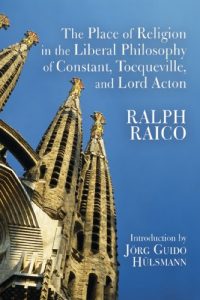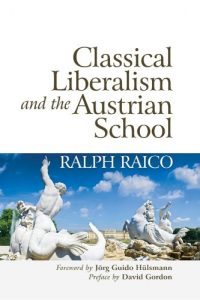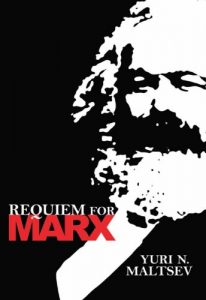Historian Ralph Raico wrote this dissertation 40 years ago under the direction of F.A. Hayek. Its revelation of a form of early liberalism heavily influenced by moral concerns and steeped in an older religious ethos has major implications in our own time as well.
Despite its historical focus, Raico's thesis directly addresses controversies that were boiling over in the 1960s. The Cold War was raging. Conservatism, to which the defense of free enterprise had fallen after World War II, had been redefined by the National Review to mean the backing of the US military state in its life-or-death struggle with communism abroad.
The Cold War was not the only contentious issue at that time. Indeed, the conservatives characterized the libertarians as not only wrong on military matters but philosophically corrupt, because they had inherited the secularism, the anticlericalism, and the essential antinomianism of the liberal school of the Enlightenment. Conservatives attempted to portray libertarians as part of the hippy, dropout generation that spoke vaguely of freedom and rejected all manner of social authority.
It was during this period that Ralph Raico went to work on his dissertation — an extended discussion of three important figures in the history of liberalism for whom a religious orientation and overarching moral framework was central: French Protestant Benjamin Constant (1767–1830), French Catholic Alexis de Tocqueville (1805–1859), and Lord Acton (1834–1902).
Raico provides a detailed reading of their work and shows that one need not embrace statism, that one can be a consistent and full-blown liberal in the classical tradition, and yet not come anywhere near embodying the then-current libertarian stereotype.
It is striking how relevant Raico's treatise remains after 40 years. Though conservatives who were blasting away at libertarians in the 1960s never saw this book, which has only now been published, this classic study remains as powerful as ever.
To search for Mises Institute titles, enter a keyword and LvMI (short for Ludwig von Mises Institute); e.g., Depression LvMI
Despite its historical focus, Raico's thesis directly addresses controversies that were boiling over in the 1960s. The Cold War was raging. Conservatism, to which the defense of free enterprise had fallen after World War II, had been redefined by the National Review to mean the backing of the US military state in its life-or-death struggle with communism abroad.
The Cold War was not the only contentious issue at that time. Indeed, the conservatives characterized the libertarians as not only wrong on military matters but philosophically corrupt, because they had inherited the secularism, the anticlericalism, and the essential antinomianism of the liberal school of the Enlightenment. Conservatives attempted to portray libertarians as part of the hippy, dropout generation that spoke vaguely of freedom and rejected all manner of social authority.
It was during this period that Ralph Raico went to work on his dissertation — an extended discussion of three important figures in the history of liberalism for whom a religious orientation and overarching moral framework was central: French Protestant Benjamin Constant (1767–1830), French Catholic Alexis de Tocqueville (1805–1859), and Lord Acton (1834–1902).
Raico provides a detailed reading of their work and shows that one need not embrace statism, that one can be a consistent and full-blown liberal in the classical tradition, and yet not come anywhere near embodying the then-current libertarian stereotype.
It is striking how relevant Raico's treatise remains after 40 years. Though conservatives who were blasting away at libertarians in the 1960s never saw this book, which has only now been published, this classic study remains as powerful as ever.
To search for Mises Institute titles, enter a keyword and LvMI (short for Ludwig von Mises Institute); e.g., Depression LvMI









